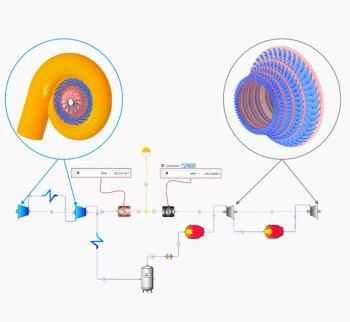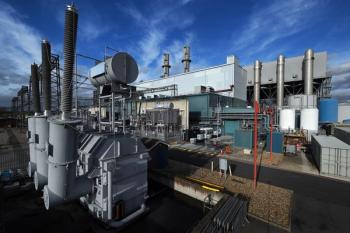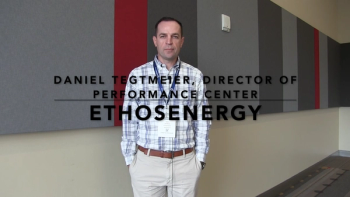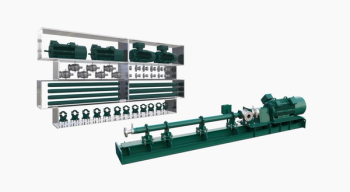
HEPA KNOCKS OUT NEED FOR WATER WASHING
ALLIANCE PIPELINE’S FIELD EXPERIENCE APPLYING HYDROPHOBIC HEPA INLET AIR FILTERS TO A FLEET OF GAS TURBINES
Getting maximum performance and reliability out of a turbine requires keeping the blades clean in order to reduce drag and improve the heat rate and power output. Inlet air filters can reduce the amount of fouling a turbine will experience.
Recently, Alliance Pipeline tested hydrophobic (High-Efficiency Particulate Air) HEPA filters on two of its pipeline compressors. In a year of field testing, Alliance found that these filters had the same pressure drop as existing, lower efficiency filters, and that they eliminated the need to shut down compressors for off-line water washing (OLWW).
The Alliance Pipeline operates a 1,857 mile pipeline transporting natural gas from the Western Canada Sedimentary Basin to markets in the U.S. The 36” pipeline connects with 52 receipt points in Canada and one in the U.S. The company uses 19 Dry Low Emissions (DLE) gas turbines from GE, Siemens and Solar with a combined 517,000 HP to compress the gas and push it along the pipeline.
A single 7,700 hp Solar Taurus engine in Northeastern BC and a pair of Siemens SGT-200 Tornados (7,000 hp each) in NorthwestAlberta are used in the collection fields. Two GE LM2500+ DLEs (42,070 hp each) and an LM2500 Plus+ DLE (46,000 hp) provide compression at the firstmainline station, two operating 24/7 and the other on hot standby. One LM2500+ DLE and 12 LM2500 DLEs (31,200 hp each) are situated at compressor stations spaced about 125miles apart as the pipeline makes its way southeastward towards Illinois, maintaining the pressure at 1,750 psi on the Canadian segment and 1,945 psi on the U.S. side.
The compressor stations are located in a variety of rural locations and the turbines ingest different materials depending on the location, such as dirt, dust, ice, snow and salt. Accumulated dirt in the compressor section results in increased fuel consumption, maintenance outages and decreased hot section life.
Alliance scheduled three OLWWs per year on each of its turbines, a total of 57 outages per year for cleaning, in addition to other outages for inspection and maintenance. OLWWs reduced efficiency losses, but the compressors exhibited a 2% to 3% efficiency drop between washes. OLWW also required sending a crew to a remote location. And every year, 13,000 liters of water contaminated by cleaning fluid had to be disposed of.
Switching to HEPA inlet filters would keep compressors cleaner, but they generally have a higher pressure drop and need to be replaced sooner than traditional filters. However, Alliance learned about a hydrophobic HEPA filter (sidebar) being used by TransCanada on two LM6000PDs at its Grandview Power Plant in New Brunswick. TransCanada had been shutting down the turbines every six weeks for cleaning, butwas able to eliminate the shut downs by installing the latest HEPA filters.
In April 2010, Alliance began testing HEPA filters at two locations: The LM2500+G4 in the Windfall station, the fleet’s highest HP unit, and a midstream LM2500 unit at Kerrobert. Both units showed negligible system pressure drop difference from the previous filters.
Six months later, boroscopic inspections revealed a clean High Pressure Compressor (HPC).After 4,300 hours, the Kerrobert test unit required a top case removal to repair a Stage 16 blade platform. Generally after that many hours, the bell mouth and the Stage 1 to 5 blades and vanes would be dirty, but no dirt of any kind could be found in this area (Figure 1).
Two years later the turbines maintain their efficiency levels without washing. And the filters retain their low pressure loss. It is expected that the HEPA filters will have a comparable lifespan to the less efficient filters. But it will take another two years of operation to conclusively prove that. Based on these tests, Alliance is outfitting its fleet with HEPA filters by the summer of 2012. At that point, OLWWs will cease on all nineteen turbines.
Author
Rob McMahon is a Gas Turbine Fleet Manager with Alliance Pipeline. Steve Medvetz is turbine filter manager with W. L. Gore & Associates. For more information
Newsletter
Power your knowledge with the latest in turbine technology, engineering advances, and energy solutions—subscribe to Turbomachinery International today.




